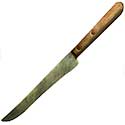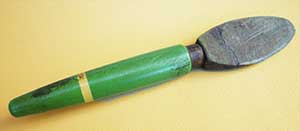Knife grinders, Victorian and early 20th century UK

A knife grinder was a street merchant who came round the streets to sharpen all sorts of blades, not limited to knives. This page explains why knife grinders used to be needed, but no longer are; how they plied their trade; how their grinding wheel worked and was powered; how they travelled and where they ate and slept.
____
Extracted from the memoirs of the webmaster's mother (1906-2002) and edited by the webmaster with further research
Why knives used to need frequent sharpening
Knives, scissors and other blades have always been in constant use, just as they are today. Before the 20th Century, though, the blades were not the hard, stainless type of steel that we know today. They got worn away much more rapidly than we are used to today, as the image at the top of the page shows clearly. So knives and other blades needed to be sharpened frequently.

Victorian or Edwardian scissors, blackened and blunted with age and use because they were made of steel which was not stainless.
A small amount of sharpening might be done at home using gadget like that shown below but it was hard work. It also needed a certain amount of skill because the blade had to be slapped across the stone in one direction only. Otherwise it actually made the blunting worse.

Hand-held knife sharpener for home use
So it was standard practise to take advantage of a professional knife grinder.
What a knife grinder was
A knife grinder - or a knife sharpener - was a street merchant who came round the streets with his own specialist equipment to sharpen any and all types of blades.
How the knife grinder's grinding wheel was powered
The knife grinder that I knew had a grinding wheel in his handcart and he drove it with a treadle system operated with his foot. Other knife grinders used different systems but they all used foot power to drive their grinding wheels. Some pedalled to wherever they were trading on adapted bicycles. Once there, they let down a stand on the back wheel to hold the bicycle upright and arranged for their pedal power to drive the grinding wheel.

Early 1900s knife grinder. Detail from a photograph in the Willis Museum, Basingstoke. Unfortunately it does not show how his feet are working to drive the wheel.

This image came from a magazine memoirs pinned to my mother's memoirs of knife grinders, but was probably photographed at a heritage fair as it looks too grand for regular functional use.
How knife grinders plied their trade
The knife grinder would get custom by first standing in the road and calling out in his sing song voice:
"Any knives or scissors to grind?"
Then, having alerted the women, he would knock at every door in the road with the same question.
How knife grinders travelled
Knife grinders covered large areas. The one that I knew travelled on foot with his equipment on a handcart with three wheels, one in front and two at the back.
Where knife grinders slept and ate
contributed by J.Z. Joseph Zarlenga, son of a street knife grinder
As the son of one of these travelling street vendors, I can tell you where they slept and ate on their travels. Most of the time they knew where they would be headed, so they planned accordingly.
My father's favourite places to sleep were the town Fire Departments. Since the firemen worked 24 hours per day, they had their own kitchens and make-shift beds. My father would ask to stay the night and for that favour, he sharpened any utensils that they needed sharpened. So he was out of the weather, in case of rain.
Many of his meals were had by offering to sharpen a restaurant owner's knives in exchange for a sandwich or soup.
Note from the webmaster
This page really needs a good photo of an old-style knife grinder to give a better indication of how he used his feet to power his grinding wheel. If you can supply such a photo, I would be very grateful.
| sources | webmaster | contact |
Text and images are copyright
If you can add anything to this page or provide a photo, please contact me.



